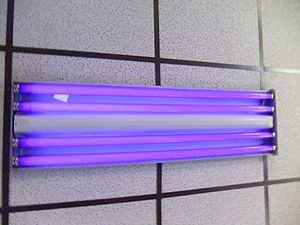Fluorescent bulbs

Newer compact fluorescent bulbs (CFLs) are energy-efficient light bulbs. They contain tiny amounts of mercury, so the hard part is getting rid of them when they burn out.
Fluorescent lights also include highly efficient triphosphor bulbs, with a triple layer that helps create a more pleasant light. Where these are in the older, larger size, they cannot easily be used to replace incandescent bulbs; they are also typically more expensive than CFLs, but also last longer.[verification needed]
Mercury is sadly also a necessary part of most compact fluorescent bulbs, the kind that environmentalists and some governments are pushing as a way to cut energy use. However it is considered to be in small enough quantities to not be a serious environmental or public health threat.
With an estimated 150 million CFLs sold in the United States in 2006 and with Wal-Mart alone hoping to sell 100 million this year, some scientists and environmentalists are worried that most are ending up in garbage dumps. Mercury can damage the kidneys and liver, brain, and in sufficient quantities can cause death - these are not serious threats from a CFL bulb, but it is still best to avoid breaking them.
U.S. regulators, manufacturers and environmentalists note that, because CFLs require less electricity than traditional incandescent bulbs, they reduce overall mercury in the atmosphere by cutting emissions from coal-fired power plants. But some of the mercury emitted from landfills is in the form of vaporous methyl-mercury, which can get into the food chain more readily than inorganic elemental mercury released directly from a broken bulb or even coal-fired power plants, according to government scientist Steve Lindberg. [1]